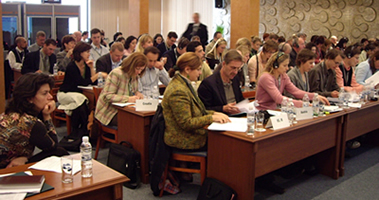
EPPO Workshop for Inspectors
Plovdiv, BG, 2007-11-14/16
More than 90 participants from 26 countries participated in the EPPO Workshop for inspectors at Plovdiv, Bulgaria. This Workshop provided the opportunity for inspectors to exchange views and share their experiences of the organization of import inspection in different EPPO member countries as well as on sampling for imported consignments. They were welcomed by Mr Ventsislav TODOROV, Director General of the Bulgarian NPPO and Mr Tsvetan Dimitrov who gave a welcome speech on behalf of the Ministry of Agriculture and Food Supply. Presentations were made on EPPO activities and countries' experience related to this topic.

The implementation of the ISO standard 17020 “General criteria for the operation of various types of bodies performing inspection” for phytosanitary import inspections in Latvia was presented and discussed. Discussions also took place on actions to be taken in the case of finding of a non regulated pest. The participants were reminded of the existence of the EPPO Standard PM 5/2(2) “Pest risk analysis on detection of a pest in an imported consignment”. This standard provides a simplified PRA scheme to be used when an unfamiliar pest is detected in an imported consignment, in order to decide whether phytosanitary action is needed. It was noted that some countries have implemented a system to deal with such situations (e.g. Dutch quick scan system).
The Workshop also made the following conclusions:
- EPPO databases such as PQR and EPPT are very useful in performing inspections and the inspectors welcomed the decision that a free online version of PQR should be provided in the near future.
- EPPO standards on inspection procedures are needed. In particular, for the inspection of wood, grain, bonsais and fruits.
- The inspection of imported plants for planting at their place of destination after a certain period following their import is considered as a valuable procedure as some pests cannot be detected during import inspection (even when such inspection is carried out at their place of final destination). Such inspections are usually part of the general monitoring programme established by NPPOs. Nevertheless the Workshop highlighted that within the EU, there is a need to exchange information about movements of plants for planting imported into one country but intended for another one (plant health movement document).
- Guidance on sampling for bulk consignments is needed.
- Reduced frequency of inspections could be a possible topic for future workshops
During this meeting, participants visited a garden centre where inspections are carried out. Warm thanks are due to Ms Tsvetkova and her colleagues for the very fine organization of the Workshop and a most friendly welcome in Bulgaria.
Presentations
Introduction
Presentation of the Bulgarian NPPO – Mr Lyubomir Kirilov
International Standard on Phytosanitary Measures no. 23 'Guidelines for inspection' – Mr Andrei Orlinski (EPPO Secretariat)
EPPO programme on phytosanitary procedures for consignment inspection and places of production inspection – Ms Françoise Petter (EPPO Secretariat)
Presentation of the draft Commodity-specific phytosanitary procedure: consignment inspection of Fragaria plants for planting – Mr Ernst Pfeilstetter (DE)
EPPO databases and relevant standards for inspection – Ms Françoise Petter (EPPO Secretariat)
Import inspection experiences in EPPO member countries
Import inspection experiences at border inspection posts in Emilia-Romagna and Veneto regions – Mrssrs Franco Finelli & Marco Vetorazzo (IT)
Import control at the border inspection point for fresh fruits – Mr Demetris Koudounas (CY)
Import inspection system in Latvia – Ms Kristina Romanova (LV)
Import inspection of plants for planting in France – Ms Anne Souchaud (FR)
Import inspection in Lithuania – Mr Gintaras Lapinskas (LT)
Post entry inspections in Bulgaria – Ms Doroteya Chavdarova (BG)
Import inspection in Hungary – Mr Tamas Szekely (HU)
Post-entry inspections of imported plants for planting in Slovenia – Ms Alenka Pivk & Ms Mojca Lešnik (SL)
Phytosanitary control of plants at the place of inspection for plants for planting and documentary check at the border inspection post – Mr Efthimios Odisseos (CY)
Import control in Bulgaria – Ms MariaTomalieva (BG)
Sampling
EPPO and IPPC standards on sampling of consignment for visual phytosanitary inspection – Ms Françoise Petter (EPPO Secretariat)
Sampling methods in relation to bulk consignments – Mr Thorwald Geuze (NL)
Sampling procedures for grain – Mr Franco Finelli (IT)
Some practical problems when sampling - experiences from import, and post entry, inspections – Ms Johanna Jansson (SE)
